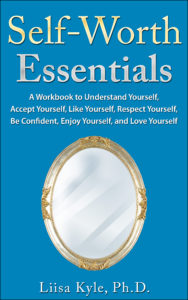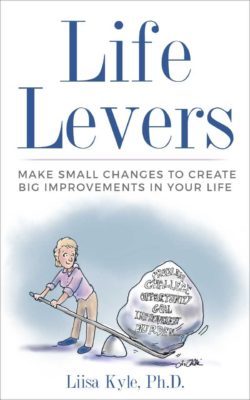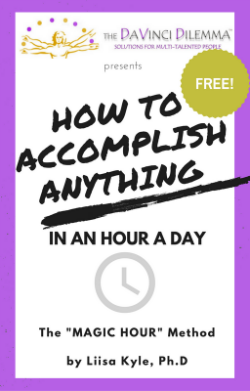
By Jericho [CC BY 3.0 (https://creativecommons.org/licenses/by/3.0)], via Wikimedia Commons
Why?
Left unchecked, financial fears can cause untold stress. It can manifest as negative psychological and physiological symptoms. It can strangle your happiness and creativity. Money anxiety can stop you from investing in your talents, from taking creative or entrepreneurial risks and/or from pursuing your true calling.
Note: Sometimes, other people’s financial fears can have the same effect: How many of us have wasted years in ‘practical’ professions so as to avoid the dire ‘starving artist’ situation our family, teachers, friends and/or society feared would be our fate? They may have meant well…but their money concerns can push you into unwanted directions. And the truth is that our family, teachers, friends and/or society cannot predict the actual consequences of any of our decisions. Accordingly, Step One for overcoming financial fears is to recognize and sidestep other people’s money anxiety.
Step Two is to understand your own.
There are different kinds of financial fears:
1. Fear of spending.
Are you a “saver”? There are many benefits to being frugal and fiscally conservative. The caution here is if your focus is on saving, saving, saving — on avoiding ANY expenditures…even those that are investments in your talents. If you have ample money in the bank yet you’re not investing in your talents — and/or you are denying yourself ‘frivolous’ treats (which probably means ANY treats), then your fear of spending is interfering with your creativity and well-being. If that sounds familiar, ask yourself: why am I not spending a portion of my money on my talents? Why am I not spending a portion of money on myself?
2. Fear of saving.
The flip side of being a “saver” is being a “spender”. You know who you are. You shop ’til you drop, max out your credit and otherwise live beyond your means. Again, the question to ask yourself is why? What are the consequences of your over spending? How does it affect your creativity, level of stress, relationships, etc.?
3. General financial anxiety.
For many people, it doesn’t matter how much money they have, spend or save — they’re chronically anxious about all things financial. If you detect a generalized, low-grade discomfort about your finances, try to pinpoint the source of your concern. What, exactly, are you afraid of?
4. Financial avoidance.
Then there are those who deal with financial matters by avoiding them. My husband is one of these. He simply doesn’t want to deal with anything fiscal. He hasn’t seen a bill, bank book or credit card statement in a decade. (Luckily, he has me to intervene). If you are a financial avoider — whether or not you have someone to deal with your finances on your behalf — your attitude towards money affects pretty much every area of your life. If you are avoiding money matters, odds are you are also avoiding financial opportunities…and ignoring potential fiscal problems. Avoid the former and you’re denying yourself financial rewards. Avoid the latter and you risk losing everything. If you are a financial avoider, ask yourself: what can you do to address your financial situation? Is there anything you can do to make money matters more palatable? Can you hire someone to handle them for you?
5. Fear of poverty. (Also known as the bag lady/ homeless person fear).
This is often a completely irrational (yet vivid) concern: the fear of ending up on the street with nothing. It seems to be rather prevalent among Type A folks, entrepreneurs and over-achievers…which is ironic because these people are the least likely to end up in dismal financial straights.
If you fear extreme poverty, do a reality check: Play out a few ‘worst case’ scenarios — what would happen if you lost your primary source(s) of income? What would you do? What options would be available to you? How likely is it, really, that you will lose everything and end up in the elements, pushing a shopping cart? When most of us stop and think honestly about it, we understand that our worst case scenario is very unlikely. Should our primary source(s) of income disappear, we would take action to find support elsewhere. The entrepreneurial among us may even thrive in such circumstances.
6. Fear of financial success.
Some people fear the inherent trappings of wealth: they’re afraid that if they become wealthy, other people will be jealous — or won’t like them. They’re afraid of the inevitable complications — like people coming out of the woodwork, asking for money. Or unscrupulous money managers. Or being in a higher tax bracket. Or the stress of choosing wise investments. If they have low opinions of wealthy people, then they may fear becoming one. They may be concerned that they will lose integrity or kindness.
What do you think about wealthy people? Are they kind and honorable? If your gut answer is ‘no’, then subconsciously you certainly wouldn’t want to become one…and you may well be sabotaging your finances unwittingly.
Here’s the key: your underlying beliefs about money affect the money you make. If you don’t think you’re worthy of wealth, you won’t be.
*****
An astute reader, such as yourself, will have noticed in these descriptions that within every financial fear lies something deeper. It might be feelings of inadequacy or of low self-worth. It could be deep-seated beliefs about wealth or the wealthy. Before you can put your finances in order, you need to identify what’s really going on. Once you identify the source of your thoughts about money, you can address them and take appropriate fiscal actions.
If you want to know what’s really, truly important to you, look at your calendar, your bank book and your financial statements. On what are you spending your time? On what are you spending your money? Really take a look at it. If you have ‘no money’ for your talents…but you’re spending hundreds of dollars on less important things, you are speaking through your wallet to say that your talents are not important….i.e. you are not important.
So let’s break this cycle by working through what’s really underlying your financial fears:
1. When you were growing up, what were the attitudes towards money in your home?
How was money talked about in your household? What finance-related phrases did you hear the most?
2. Think of an incident involving money or finances when you were young. What happened? What were the consequences?
3. Now, let’s shift to today. To what extent is your present attitude about money and finances similar to — or different from — that when you were growing up?
4. What words would you use to describe someone who is wealthy?
5. As you think about money and finances, how do you feel? Why?
***
Activity: This week, pay attention to your thoughts about money and finances. Make note of the emotions you experience, in regards to money and finances. (It’d be ideal if you actually write down your thoughts and experiences). Avoid judging yourself — be a neutral observer. You’re simply collecting data.
Activity: One week from today, review your answers above plus your observations from the week. What do you notice? What conclusions do you draw?
*****
Check out my workbook for proven, practical ways to understand yourself, accept yourself like yourself, respect yourself, be confident, enjoy yourself, and love yourself. Available here in paperback and ebook format: http://bit.ly/SelfWorthEssentials
*****
If you’d like to share or publish this article, you may, if you include the author’s name, a link to this original post and the following text blurb:
Are you struggling with too many talents, skills, ideas? You may have The DaVinci Dilemma™! Find tools, fun quizzes, coaching, inspiration and solutions for multi-talented people at http://www.davincidilemma.com/ .




